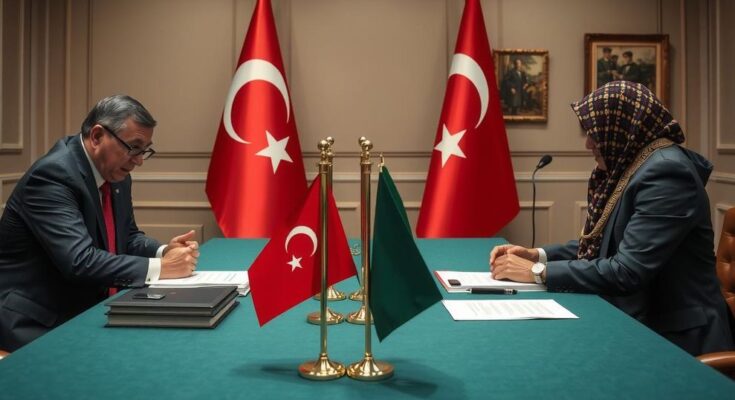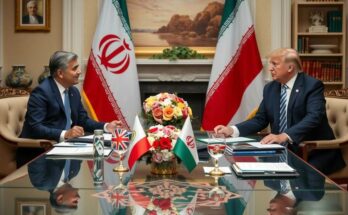Somali President Hassan Sheikh Mohamud and Ethiopian Prime Minister Abiy Ahmed reached an agreement in Ankara to resolve a maritime crisis exacerbated by Ethiopia’s memorandum with Somaliland. The Ankara Declaration recognizes Somalia’s territorial integrity and grants Ethiopia access to its coastline, aiming for peaceful cooperation and addressing both nations’ interests under the mediation of Turkey.
On Wednesday, October 25, 2023, Somali President Hassan Sheikh Mohamud and Ethiopian Prime Minister Abiy Ahmed convened in Ankara, aiming to resolve a prolonged maritime conflict influenced by Turkey. Turkey had been mediating a port access agreement, estranged due to disputes surrounding an earlier memorandum of understanding (MoU) between Ethiopia and Somaliland. Somalia’s government perceived this agreement as a potential acknowledgment of Somaliland’s sovereignty, which it vehemently opposed, threatening military action to defend its territorial claims.
President Recep Tayyip Erdogan’s insistence that the leaders reach a consensus was indicative of Turkey’s vested interests in the region. With a robust presence in Somalia since 2011, Turkey has established military ties, facilitated humanitarian assistance, and provided significant military training to Somali forces. Following extensive discussions that lasted nearly seven hours, the negotiation teams addressed Ethiopia’s recognition of Somalia’s territorial integrity, a crucial demand from Mogadishu. Abiy was initially hesitant to agree to the term ‘territorial integrity’; however, the discussions ultimately led to the Ankara Declaration, which recognized Somalia’s territorial unity while allowing commercial access for Ethiopia to the Somali coastline.
Significantly, the agreement entails a structure for future diplomatic and technical discussions, expected to start in February 2025. Analysts perceive this as mutually beneficial, highlighting that Somalia has successfully leveraged its maritime strategy to its advantage, while Ethiopia secures essential access to international waters. Abiy Ahmed’s concessions were viewed as strategic, balancing both national interests and international diplomatic pressures, particularly from the United States, which seeks stability in the region.
The maritime dispute between Somalia and Ethiopia stems from Ethiopia’s need for sea access as a landlocked nation and Somalia’s territorial claims over Somaliland, a region that has sought independence. The prior MoU signed by Ethiopia and Somaliland threatened Somalia’s territorial integrity, leading to increased tensions. Turkey, with longstanding relations in the Horn of Africa, has engaged in mediation to foster stability and support regional dialogues. The negotiations proved complex due to the varying perspectives of both nations regarding sovereignty and territorial claims, necessitating a profound diplomatic intervention to achieve a workable agreement.
In conclusion, the Ankara Declaration between Somalia and Ethiopia marks a pivotal step towards resolving a long-standing maritime dispute, achieving a compromise that acknowledges Somalia’s territorial integrity while affording Ethiopia the much-needed port access. This development underscores Turkey’s influential role in the region, promoting diplomatic engagement amidst acute geopolitical tensions. The agreement illustrates a calculated diplomatic maneuvering by both Somali and Ethiopian leaderships, propelled by broader geopolitical interests and local political considerations, ultimately fostering a collaborative approach to regional maritime governance.
Original Source: www.middleeasteye.net




